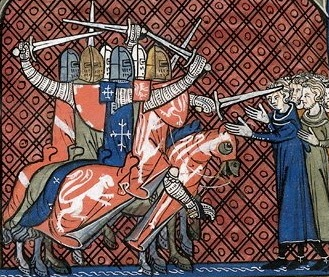Medieval Swearing, “God’s Bones!”

There are trends and fashions in swearing. Things that were outrageous and blasphemous in one age might raise nothing but a curious stare in the 21st century.
It’s difficult today to understand why swearing by parts of God’s body would be offensive, but it was a popular way of swearing up to the end of the 15th century. People would swear by “God’s Nails” or “God’s Bones”, “God’s Teeth”, even “God’s Balls!”
It a tough concept to get your head around, but I’ll try to explain it as best I understand it myself. So, to the medieval mind swearing an oath was a deadly serious affair. If you swore a sincere oath you were asking (even forcing) God in heaven to look down and guarantee what you said was in fact true. In an age where religion was an integral part of daily life, if you swore a false oath you were in effect making God out to be a liar! In addition, to swear by parts of God’s body you were literally thought to be affecting those parts of his body up in heaven. These words and phrases have a power that is mostly lost on us today, but you would use them when you trapped your finger in a door, insulted someone, even expressed joy and amazement.
On the other hand, some words and phrases which were part of everyday speech in the medieval ages would today, in polite company at least, raise eyebrows. Describing bodily functions wasn’t a big deal, and it was normal practice for something like a street name to reflect the street’s function or the economic activity taking place within it. Which explains streets in many medieval towns called Gropecuntlane, Oxford and London to name just two. You can image what went on there. The local stream might well be called the Shitebrook for similar reasons….
I confess I find this sort of stuff fascinating. It might not be your cup of tea, but if you are interested, there’s a brilliant book about the history of swearing, “Holy Sh*t” by Melissa Mohr. It’s available on amazon.